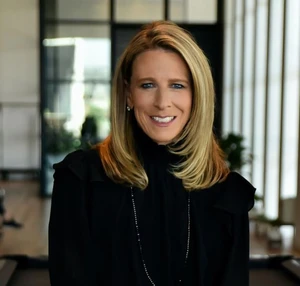But don’t expect platforms like BetMGM, Caesars Sportsbook, DraftKings, ESPN BET, Fanatics Sportsbook or FanDuel to have operator-branded platforms in the state.
“I can tell you what they won’t be,” California Nations Indian Gaming Association (CNIGA) chairman James Siva said. “They won’t be operators in the state. If they want to be partners like the slot companies we work with, then we can do that. I think they are starting to come around.
“And I think urgency is the right word… but right now, while it’s urgent, we won’t be hurried and we will make decisions based on real data. We are going to make sure we stay united in purpose. Keep that urgency in the back of your mind, because we need to do it, but we need to do it right.”
FanDuel apology tour continues
Earlier in the day, FanDuel CEO Amy Howe continued the company’s mea culpa tour, telling Indian Country that the company made a mistake in trying to run a ballot initiative to legalise online sports betting in California in 2022.
The apology tour started in February, when company president Christian Genetski told tribal leaders at the Western Indian Gaming Conference that the effort “was definitely a spectacular failure on our part. It wasn’t the right plan or the right time.”
At the time, he used the words “uninformed” and “misguided”, which Howe echoed Tuesday.

No matter how operators respond going forward, it appears that California’s Indian Country is more unified and prepared to act as one in the quest to legalise.
Although no one on the dais would commit to a timeline, the first available opportunity for an initiative is 2026 and, given concerns raised by Daniel Salgado, a CNIGA executive board member and chairman of the Cahuilla Band of Indians, tribes will aim to move sooner than later.
“We are united in purpose, we want to help the (Revenue Sharing Trust Fund) tribes,” Salgado said. “So how long should those tribes continue to live in poverty? Do you feel that urgency to help the RSTF tribes?
“If you do, we will move forward. I feel the understanding, the urgency, but I tell my tribe that we won’t get it until we are ready for it. I feel the pressure because I see those third-world situations, no water, no electricity, no gas and that is on our reservations.”
“No tribes left behind”
Of California‘s 100+ tribes, 72 are part of the RSTF and receive $1.1m per year from the gaming-tribes’ fund.
When it was established more than 20 years ago, the concept and fund itself were considered cutting edge. Now, Salgado and other leaders seek an increase in funding but, potentially more importantly, it appears the plight of the RSTF tribes will play a key role in determining what legal wagering California ultimately looks like.
Siva and Salgado repeatedly used the phrase “no tribes left behind”. San Manuel Band of Mission Indians chairman Johnny Hernandez said: “We have to benefit all tribes and we have to have unity. If you divide tribes, we’re all doomed to fail.”

Hernandez’s tribe was behind a digital sports betting initiative that ultimately did not make the 2022 ballot, but could serve as a guide for the next go-round.
“With Prop. 26, we thought things were flawed and it didn’t go far enough. So we wanted to be in the drivers seat,” Hernandez said of Prop. 26. “How do you get a model in there for the RSTF tribes to be comfortable? So, we had a model in there to provide funds for RSTF tribes. Not only does sports betting have to be for everyone, but it has to support everyone and it’s just the start before igaming.”
Tuck in, because the wait continues
So, when will the tribes move on legal sports betting?
Everyone is “going to have to continue to wait”, Siva said. “When we have our timeline, we’ll let you know. Tribes are the operators for gaming in California, period.
“When that happens, we will decide what the path forward is. And if we decide to partner with a group like FanDuel or DraftKings, then we will let them know what our terms are and they can decide if they want to move forward.”
Original article: https://igamingbusiness.com/sports-betting/operator-branded-platforms-wont-have-a-home-in-legal-california-wagering/













